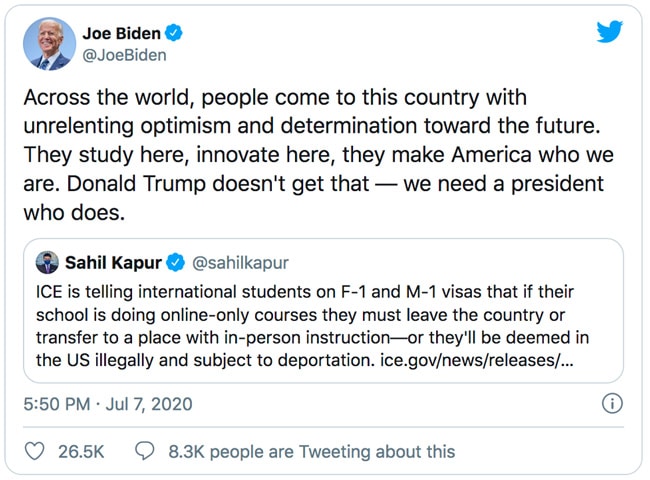New Biden presidency offers hope to international students and educators in the US
- The inauguration of Joe Biden and Kamala Harris as President and Vice President of the United States occurred today, 20 January 2020
- The new administration has signalled it will break with the Trump administration’s restrictive policies towards international students and intends to repeal the travel ban affecting Muslim-majority nations
- President Biden’s priority is to fight the pandemic in the US and abandon Trump’s isolationism in favour of cooperation with the rest of the world
The United States has a new President and Vice President, and the new administration will usher in an entirely different policy agenda and approach to relations with the rest of the world. President Joe Biden and Vice President Kamala Harris plan to lead a programme of immigration reform, and in the process create a more welcoming environment for foreign students in the US.
The new administration’s agenda and worldview will hold particular meaning for students overseas who have had long-held dreams of studying in the US but who have been dissuaded by the outgoing administration’s anti-immigration stance and volatile policies with regard to student visas and work permits.

Foreign enrolment growth slowed then declined
Under President Trump, the number of international students in the US grew very slightly – and then not at all. In 2018/19 the international student population in American universities increased by only 0.05%, and in 2019/20, there was a decline of 2% – the first such decline since 2005/06.
The Trump era will be remembered for the government’s travel bans affecting Muslim-majority nations, proposal to limit visa terms for international students, deep suspicion of Chinese foreign students, and growing antipathy towards immigration infrastructure allowing international students to remain in the US to work after graduation.
Repealing the travel ban
It appears likely that the proposed rule to limit visa terms for international students will come under fresh scrutiny under the new administration. President Biden is also expected to quickly repeal the travel ban and to move forward with a plan to issue green cards to international students completing doctoral programmes. President Biden believes as well in increasing the number of work visas for international students in areas of the economy where there are skills gaps.
That the Democrats have a majority in both the House and the Senate – an outcome that looked like it might not happen even at the end of 2020 – is expected to pave the way for the Biden government to pursue its agenda to reinvigorate higher education in the US without the need to use executive orders.
A hopeful outlook
When the news broke in early November of 2020 that Joe Biden had won the US election, Dr. Esther Brimmer, executive director and CEO of NAFSA, issued this statement:
“The past four years have been one of the most challenging periods in the history of our field, during which international educators have shown unparalleled strength and resilience. They have defended the field against travel bans, executive orders, detrimental regulatory actions, and xenophobic rhetoric. Now we face a horrific pandemic, which further threatens our field and our lives.
We are eager to work with the Biden-Harris administration as President-elect Biden has pledged to directly address many of these issues as he takes office. We are also excited to welcome Dr Jill Biden to the White House given her long-standing commitment to expanding access to higher education; specifically advancing our nation’s community colleges. To that end, we see encouraging signs that suggest a more favourable climate for international education, science, and engagement with the world.”
For additional background, please see:















